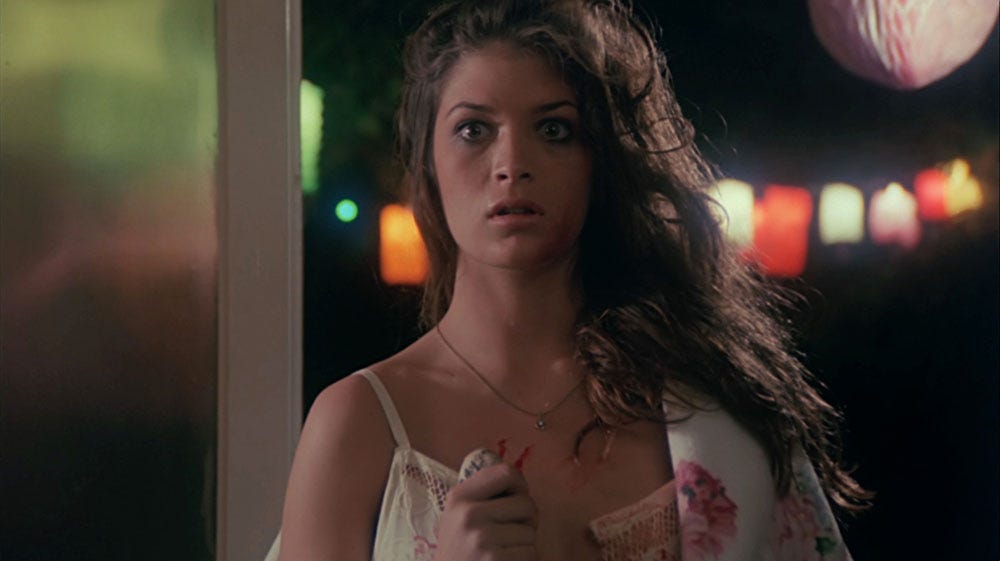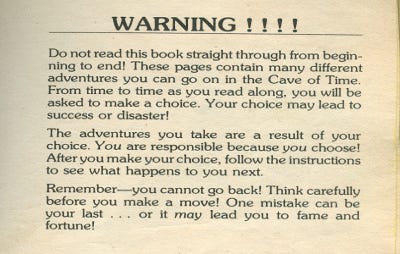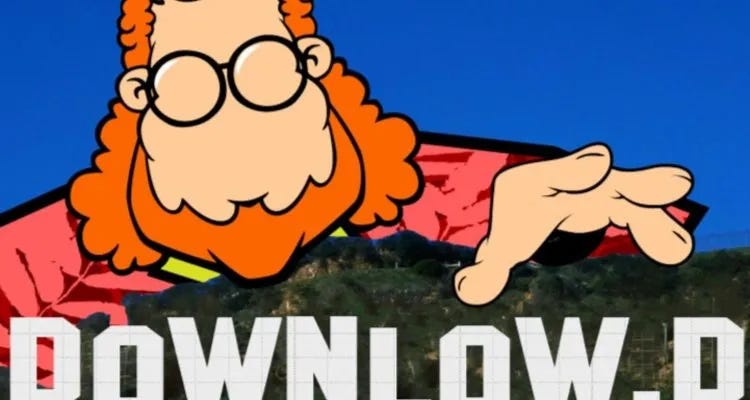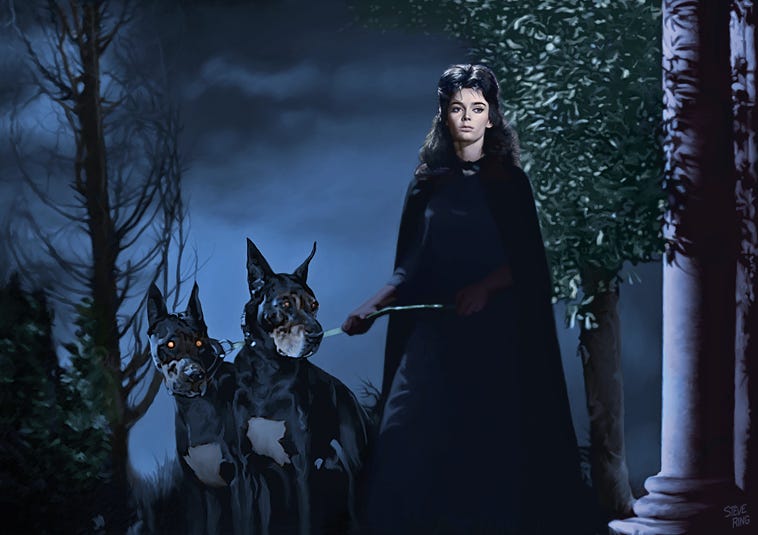"You are moving through the story": Katy Naylor, editor-in-chief of The Voidspace
Let's explore Interactive Fiction with the writer and poet who started a literary journal all about it! We're gonna have - a time !
Katy Naylor is the editor-in-chief of the voidspace, a literary journal all about interactive fiction.
We met online in 2021, when we were both getting published in the same journals; we reconnected a short time ago thanks to the work she’s done. Our conversation spanned a couple of Tumultuous Weeks in Tech, so what else is new.
Topics include: art projects made during COVID lockdowns, the indie game dev space, Choose Your Own Adventure books, Twine, Punchdrunk and interactive theatre, a reader’s AGENCY, the current state of AI art, the realities of running a literary mag vs. starting a small press, “the tension between weaponised hyperdrive empathy and escape from the bonds of the self”, the importance of having fun while you’re writing, interactive work as a good route to rediscovering playfulness, and the intense pleasure to be found in not having the ghost of your favourite author on your shoulder.
Enjoy.
We've crossed paths in a precise window of Online Life / Time when it seemed that so so many people were taking a brand new shot at building their own creative body of work: the 2020/2021 lockdowns meant an enormous number of homespun projects got launched and gained traction fast enough - we've had suddenly buzzy literary journals, we've had streaming and audio shows, and more. A few of these projects are gone now, but others, like your own, have weathered the obvious growing pains and managed to thrive. How did you land on "interactive writing" as the thing you wanted to run?
I didn't start out with the intention of running a zine or a press. My deep lockdown projects were all focused on finding my voice as a writer - I started writing in earnest in 2021 and had a very prolific couple of years. I was all over the place to be honest - mainly having fun experimenting and seeing where it took me - and it's taken me to some cool places. But one of the things that I'd really enjoyed playing with was interactive fiction.
My background there, as a reader and then a writer of IF, comes from a few different places. First off, I was the kid that ate the old school Choose Your Own Adventures for breakfast, loved text adventure games, and I even learnt to code a bit of BASIC as a nerdy 8 year old to try and write my own. In the early 2000s I discovered Twine, a tool that makes it very easy to create hyper-linked stories, and a really interesting scene around it. A lot of creators were using this tool to create really fresh, even subversive work. I read everything I could get my hands on, but I was approaching it as a reader, not a creator.
My second way in was immersive / interactive theatre. Back in 2013 I discovered Punchdrunk - the grandaddy of immersive theatre. They put on shows in huge warehouses, that they turn into fully 3d touch-real sets, that the audience can explore, and pick their own path. Later I discovered a whole vibrant scene of interactive theatre, doing different things to give audiences different flavours of agency. When lockdown hit, I really missed live theatre, and decided to use the vast amount of fan-generated notes, soundtracks and recorded plot threads to try to recreate the Punchdrunk show that had sucked me in - The Drowned Man - in twine. It's a beast of project, the length of a novel, and I hope to finish it in time for the 10 year anniversary of the show closing.
In 2021 I discovered a corner of the indie writing scene and I realised I wanted to be a part of it. But I didn't have a lot of confidence in myself as a writer, so instead of submitting traditional work I decided to pitch to a mag the concept of a short form twine text adventure game. I reckoned the novelty may make up for any defects in the writing. It - and a subsequent experiment in the form - was really well received, but I was surprised (and a little frustrated) that there wasn't a space that generally hosted this sort of work. There was a space that folded a few years ago, but nothing current. The lit world (or at least the corner of it I knew about) didn't seem to have IF on its radar at all. IF was thriving in the indie game dev space, interactivity was a big deal in the grass roots theatre circles I move in, but the lit world didn't seem to be down with the program at all. And I thought that was such a shame - all these worlds have such founts of creativity but they don't talk to each other - they don't really know that the others exist. And my corner of the lit world has so much to give to the form - I feel very strongly that interactive work can provide new opportunities to these writers, and that bringing new voices to IF can push the form into interesting new places.
So I decided to start the voidspace to try to change this - to introduce my corner of the lit world to interactive writing and get these different spaces talking to each other. The latter has a way to go (though I'm trying to make inroads) but I couldn't be happier with the success of the concept for encouraging people to try interactive writing and do things I wouldn't have thought of. For example, I imagined interactive fiction would be the main focus, but people have created interactive poetry, visual art, experiences that blur the bounds between literary and game and theatre. So while none of this was exactly intended (and I was definitely planning to spend more of my lit time writing than doing mag admin), I'm really pleased I did it.
The whole "choose your own adventure" frame can be pretty evocative for a wide number of grown-up people with extremely different backgrounds - CYOA books were cheap and mass produced, they were sold everywhere, and they came in many flavours. That said, they can have a peculiar literary feel if they're handled with some care. There's an entire section in Carmen Maria Machado's "In the Dream House" that's written and printed as a choose your own adventure story (it's about a sadly average day in a deteriorating relationship with little to no escape in the cards for the main player). Where's the lure for you, as a reader and now a publisher of interactive stories? What do you look for in someone else's interactive games? Is it about the replay potential, the mood, the feeling of getting away with something that maybe wouldn't lend itself to a conventional short story ?
This is a great question. I think for me, at heart, it comes down to agency, and the heightened emotional impact that reader / player / viewer / audience agency can give. One of my very favourite pieces of old school Interactive Fiction, Howling Dogs by Slime Maiden (formerly Porpentine) uses the interactive model to create webs of allusion, exploration and ultimately devastation that is transgressive in a way conventional fiction can't often manage, for me. You are moving through the story. It's the writer's but it's also yours, even though the narrative you and the literal you can be quite far apart, and the tension in that can be electrifying. You can be made to feel culpable, complicit, trapped, elated .. all manner of things that can be achieved by giving the reader the accountability that comes with interactivity. I've published some great short form pieces exploring experiences alien to me - disability, death, the grind of jobs I'll never have, flavours of heartbreak iI'l never experience. On the other end, I've read published fantastic whimsical pieces that play within play in ways that feel satisfying and liberating - true escapism has value too. All great art should have the capacity to provoke empathy, and I suppose the tension between weaponised hyperdrive empathy and escape from the bonds of the self are the elements that unite all the work in this form that I really love.
I just interviewed Olivia Hawker, a historical novelist who's been playing with AI in her own work. She had a lot to say, but, pulling a quote: "Whenever a new technology comes along, lazy and uncreative people try to profit from it. We'll find a new equilibrium soon."
The concern about generating text or images with AI tools is understandable, but sometimes self-published stories or stories that run on smaller outlets are perfectly fine with AI-enhanced art - my own header for this Substack comes from me messing around on Canva, I don't know if hiring an illustrator would have worked, monetary concerns aside. Anything you want to add here?
Thinking about the state of AI art now (rights and attribution issues aside, which I have no doubt will be ironed out over the next few years), makes me think about the advent of commercial photography. I wasn't there of course, but I bet it was tough for all of those illustrators, who had been relied upon by the press, magazines and advertising, to see photography take their place. I imagine accusations were levelled at photographers: you aren't putting in the work. The camera is doing it all for you.
As rough as that undoubtedly was, nobody now would say that photography isn't a valid art form. Becuase while plenty of bland and generic photography exists, we recognise that what makes a photographer great is their eye, their way of seeing and framing and capturing the light. The camera is a tool, and the best in the field use that tool with skill and subtlety.
I think the same will probably be said of artists who use AI-based tools in the future. When used badly, without creativity, the results will be bland and generic. AI in its current state does appear to default to a certain look, and that look very quickly gets tiresome.
But those who have the creative flair can use it to create truly exciting work. There is skill involved in coaxing what you want out of the machine, an iterative process of refining, and even then, the best AI based work I've seen also involves an element of manual correction - all of which needs skill and a unifying vision to make it work. When it does work, it can be very special: I've seen AI art already, even at this early stage, be used in conjunction with great poetic storytelling to create really powerful pieces. The machinery may be different to what we are used to, but it's the human heart that elevates it.
There are of course issues: the opacity of data sets and how this tool may be used against commercial artists, as commercial photography was used to push out illustrators. However, I see that as a capitalism problem, not as something that we should hold over the heads of artists (particularly indie artists who may not be able to afford a professional illustrator) who are using the medium creatively.
I've been preoccupied with how much creators seem to exist in a rigid lane. After the Twitter algorithm was “revealed”, some of what became public knowledge was already familiar to streamers and video makers: external links travel less than images, and that's the reason why the video people always attached an image to their work-related tweets , like this:
on the other hand, a "guaranteed" way to get traction was - allegedly - following people in your lane and engage with them only. So a writer would have had to follow, like and share a bunch of Twitter Writers in order to bring attention to their own work. This might work in some cases, but it's no wonder people are less and less willing to mix it up: rugged digital individualism is already been packaged as the only way you will get anywhere. Do you think this reluctance to engage with anyone who's doing different work is a product of social media over-reliance , or is it a case of "hyper-competitive drive keeping people separated" ?
I find this extraordinarily depressing, I'll admit. There's a bit of a truism that writers who publish in litmags are on the whole writing for other writers. The scene is horribly incestuous - we all write for each other and publish each other. On the one hand I suppose it's only the modern equivalent of a literary salon - only the room is marginally bigger. On the other hand, I think we all like to believe that social media may enable us to broaden our reach, and it's disheartening instead to see that insularity baked into the system.
I'm definitely hoping that the voidspace in both digital and print forms will be able to break out of that silo and reach people from at least a few different disciplines and maybe even (gasp!) general readers. But I'm not relying on Twitter to enable me to do that.
There's an element of hyper-performance that might play a part in this. A common complaint amongst artists is the fear anyone else can and will "take space away from them" - sharing and praising someone else's work might divert attention from what they are doing, and so on. Maybe a form of interactive play can be a healthy course-correction here ? Let's assume someone is reading this interview and gravely, shamefully nodding: would you suggest they try making interactive art ? Would it help ?
I cannot, CANNOT overstress the importance of play to what I want to do. I don't believe that good art can come from a place of defensiveness. In my own writing I find I need to dissociate a bit to really get anywhere: I play a lot of word games to get me into the right mindset. Some of the results you'll see if you follow the #vss365 tag.
I definitely believe that interactive work can be a good route to rediscovering that playfulness. Not that interactive work has to be light or frivolous - in voidspace 6 I am publishing a piece about sexual assault that uses interactivity to extremely powerful effect - but I do think that breaking outside of one's normal practice can be really helpful. I certainly find that making interactive work frees up a space for experiment - as the form is so young there is so much that hadn't been done yet - and in a way the stakes are lowered. You're not trying to reach a literary gold standard. You don't have the ghost of your favourite author on your shoulder. You don't - I hope - have to worry about having to please one literary clique or another. My tastes are pretty broad and I have time for work from right across the lit world spectrum. The hope is that by keeping the brief wide in terms of tone and genre, making the only requirement interactivity, a whole range of writers will be able to try something that is almost guaranteed to hit different.
For me that most important element of the voidspace is the communal aspect - encouraging participation and experimentation. I've tried to keep the subs guidelines as simple as possible and I love having pop ups, that encourage people to interact with tools from previous issues. If we can all relax a bit and get back to that space of play, the lit world (and maybe more) will be a whole lot better for it.
I started this project once I fully appreciated my overall frame was (still is) "expectations, reality and the inevitable crash". Looking at your own life as a writer and your parallel life as a lit mag editor, is there one moment that stands out to you as a case of "expectations crashing into reality" ? And is there any lesson you learnt in the aftermath ?
Gosh there's a question. I've actually found the online mag fairly low hassle to run - once I found a routine it's not been hard to get issues out every couple of months.
Starting the press has been a lot harder. Everything seems to take longer than I'd thought, and once you are asking people to part with money the stakes get a lot higher.
I think a big wake up call for me recently is realising how little time I have made for my own writing. The more successful the voidspace becomes and the greater my ambitions for it - for example starting an interview series and of course moving into print - the more it's started to feel like an unpaid part time job.
All of which is ok, but it's made me mindful of the possibility of burnout. I certainly don't want to put my writing entirely on hold either. I think the only solution I've found is to be very mindful of time and scheduling. For example I originally imagined getting 5 or 6 books a year out on the press, but I think for the sake of my sanity I'm going to keep it to 2. I'd love to run an in person event as well, part book / games fair, part live sessions, but that one will definitely have to wait.
Another lesson is to ask for help: I've seen other presses which shall remain nameless fall as a result, among other things, of that one. I'm remaining hopeful that I can make it all work, but the honest answer is I can only wait and see how it shakes out.
Whatever happens the online zine is locked in for the foreseeable future, as long as there is demand for it. I'd been concerned that interactive writing may be a passing fad for the scene, and that I wouldn't get material for more than an issue or two, but I've been pleasantly surprised that it's run and run. I can only hope that that continues - as long as it does, I'll be there to help it happen.
You can support Katy Naylor in many different ways. Here’s a few suggestions:
- read the voidspace (it’s fun)
- go say hi on Twitter, let her know if you have something good for her
If you want to play around with interactive writing yourself, the tools Katy mentioned in the interview are free and available: here’s Twine.
Catch up with the last week in Runaway:
"The early Internet was shaped by the attitudes and mindsets of straight white men": Joe Scott and the un-making of Ain't It Cool News
Some time ago I went to a tropical island for a film festival . In a landscape dominated by American film journalists clamouring for more swag bags, more guided tours, more drinks on the house, Harry Knowles managed to stand out. He held court in the lobby with a gaggle of foreign correspondents, all of them men, on the young side, eager to manoeuvre th…
I binged on MAGA Cope compilations as I was working for a right-wing outlet.
Oof, this was written before the Great Tucker Carlson Firing of 2023: skip to the very end for some links. Also, if this post is “too long for email”, as it might be, you can always read it by clicking on the “open in app” or “online” options at the very top.








